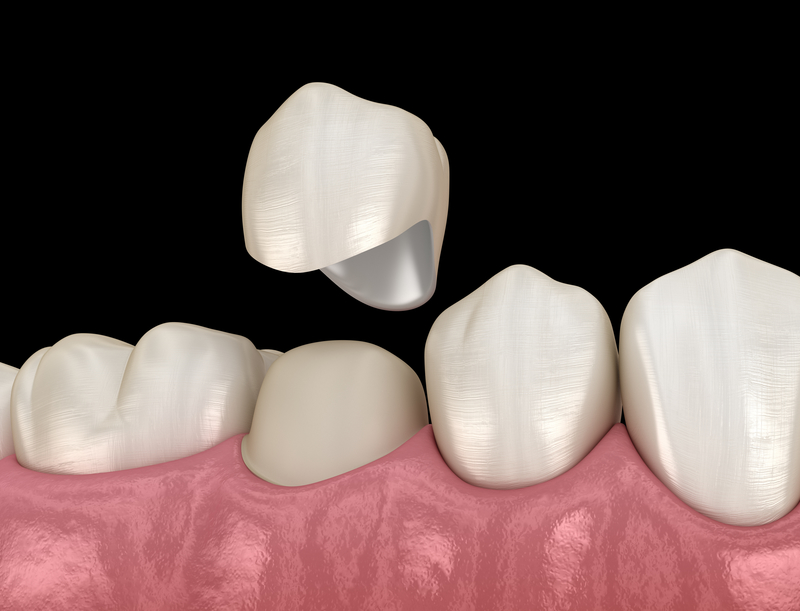Preparing For A Dental Crown

Whenever a tooth becomes too damaged that a filling can’t fix it, a dental crown will be needed to restore and reinforce the tooth. There are a variety of different dental crowns to choose from, such as ceramic, gold and stainless-steel crowns. Dental crowns can last upwards of fifteen years if you take care of them, and they create a great base for dental bridges, implants and misshapen teeth. Find out what to expect when receiving a dental crown and how you can prepare for it with these tips!
How A Dental Crown Works
Even though our teeth are the strongest substance in our bodies, they can deteriorate from tooth decay or break after an injury. Badly damaged teeth need special reinforcement to survive and function as they previously did, and many times fillings just can’t provide that structure for the tooth. Whenever this occurs, a dental crown will be necessary to protect the tooth and its enamel. A dental crown is basically a cap that is placed over a damaged tooth to prevent further injury while restoring the tooth’s shape, size, appearance and strength. Crowns are often used to restore a broken tooth, hold a dental bridge in place, support a filling, cover a dental implant and beautify discolored or misshapen teeth. Patients with dental implants and root canals often need a dental crown to cover and reinforce the affected area. An impression of your tooth will be taken to model the crown after, then the dentist will cement the crown onto the remaining part of your tooth. The crown itself cannot be removed without the help of a dentist, and it will stay in place for years unless damaged. Dental crowns can last anywhere from five to fifteen years, depending on how well you take care of them.
Choosing Your Next Dental Crown

One of the best things about dental crowns is that you have many options to choose from to get the look and protection that you want. Ceramic and porcelain crowns are two of the most popular because they are matched to your natural tooth color, but you can also opt for a porcelain-fused to metal crown that uses the same porcelain material but has a stronger hold due to the metal structure. For a crown that will not fracture, gold alloys are a great way to go. Gold alloys are a mixture of copper, gold and other metals, which keeps them from wearing away the tooth. You can also choose a base metal alloy that is corrosion-resistant and highly durable, plus it requires the least amount of healthy tooth to be removed before placement. However, these last two crowns are very noticeable to others and can be a source of self-consciousness. If you’re looking to spend the least amount of money, an all-resin crown is your way to go. While they’re more cost-effective, all-resin crowns tend to break down much faster than the other types, leaving you to pay for another expensive crown in a few years.
In the end, while appearance influences a large majority of patients’ decision regarding their next dental crown, discuss with your dentist which one would be best for your individual needs so that your tooth gets the protection it needs. You might need a more durable crown, like a gold alloy, over a natural-looking ceramic crown if your tooth needs more stability. Talk over each option with your dentist and form a plan with him/her to fit both your needs and wants.
Taking Care of Your Crown
Dental crowns are known to last for long periods of time, but they won’t if you don’t take care of them. Just like you would with any other tooth, make sure that you’re brushing and flossing around your crown to remove any decay-causing plaque that may be building up there. The crown itself can’t decay, but the teeth adjacent to it can, and your gums can suffer, too. Visit your dentist regularly so that he/she can monitor your crown and provide any minor repairs that it may need. The dentist can clean around your crown and ensure that it’s in its correct and stable position. Avoiding habits like grinding your teeth or chewing hard food, like ice, to preserve the crown’s materials.
If your crown does fall out, carefully wash the crown and be gentle as your brush your teeth. Buy some dental adhesive and replace the crown, if you can. Call your dentist as soon as your crown becomes loose or falls out so that you can schedule a same-day appointment with them. Acting quickly will prevent further damage and could save you from having to pay for another crown.
Improve The Look of Your Smile With Our Help!If you’re ready to improve your smile or fix a damaged tooth, call Dr. Evanson at (720) 409-0008! She and her staff are experienced with placing a variety of different dental crowns and can advise you on which one is best for your needs. Call today to begin your journey to a confident smile!
Leave a reply →





